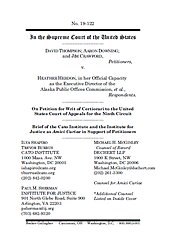Learn more about Cato’s Amicus Briefs Program.
In Alaska, if you want to contribute money to a candidate for state office or to political groups like political action committees (PACs) you are limited to a maximum $500 dollars. This is one of the lowest limits in the country, and it is 50 percent lower than the lowest contribution limit ever upheld by the Supreme Court. Moreover, accounting for inflation, the limit is lower than Vermont’s $400 limit that was struck down in the 2006 case Randall v. Sorrell.
David Thompson, Aaron Downing, and Jim Crawford want to give more than $500 to their preferred candidates and organizations. They challenged the contribution limit in court, arguing that it was an unjustified abridgement of their First Amendment rights. The district court denied the challenge and the Ninth Circuit affirmed in a decision that bizarrely ignored the Supreme Court’s decision in Randall.
Represented by superlawyer Paul Clement, the three men have asked the Supreme Court to review the Ninth Circuit’s decision. In 1976, in the foundational campaign finance case of Buckley v. Valeo, the Court held that political contributions are protected by the First Amendment. Contributions can be restricted to protect against corruption, however, but they can’t be restricted so much that effective advocacy is unduly curtailed. The Buckley Court understood that most political contributions are sincere expressions of support for a candidate rather than attempts to purchase political favors. Therefore, limits must be “closely drawn to avoid unnecessary abridgment of associational freedoms.”
Joined by the Institute for Justice, Cato has filed a brief supporting Thompson’s petition. The Supreme Court has never granted the federal or state governments license to restrict valid First Amendment activity in the extreme form embodied in Alaska’s $500 limits. The Ninth Circuit’s decision flouted Supreme Court precedent and it deserves a firm rebuke. In doing so, the Court should emphasize, once again, that core political speech and association activities, including political contributions, are entitled to robust protection by the First Amendment. Finally, the Court can take the opportunity in this or some future case to reconsider the validity of Buckley’s distinction between contributions and other expenditures and apply the same strict scrutiny to campaign contributions that it applies to other forms of core political speech.

This work is licensed under a Creative Commons Attribution-NonCommercial-ShareAlike 4.0 International License.
